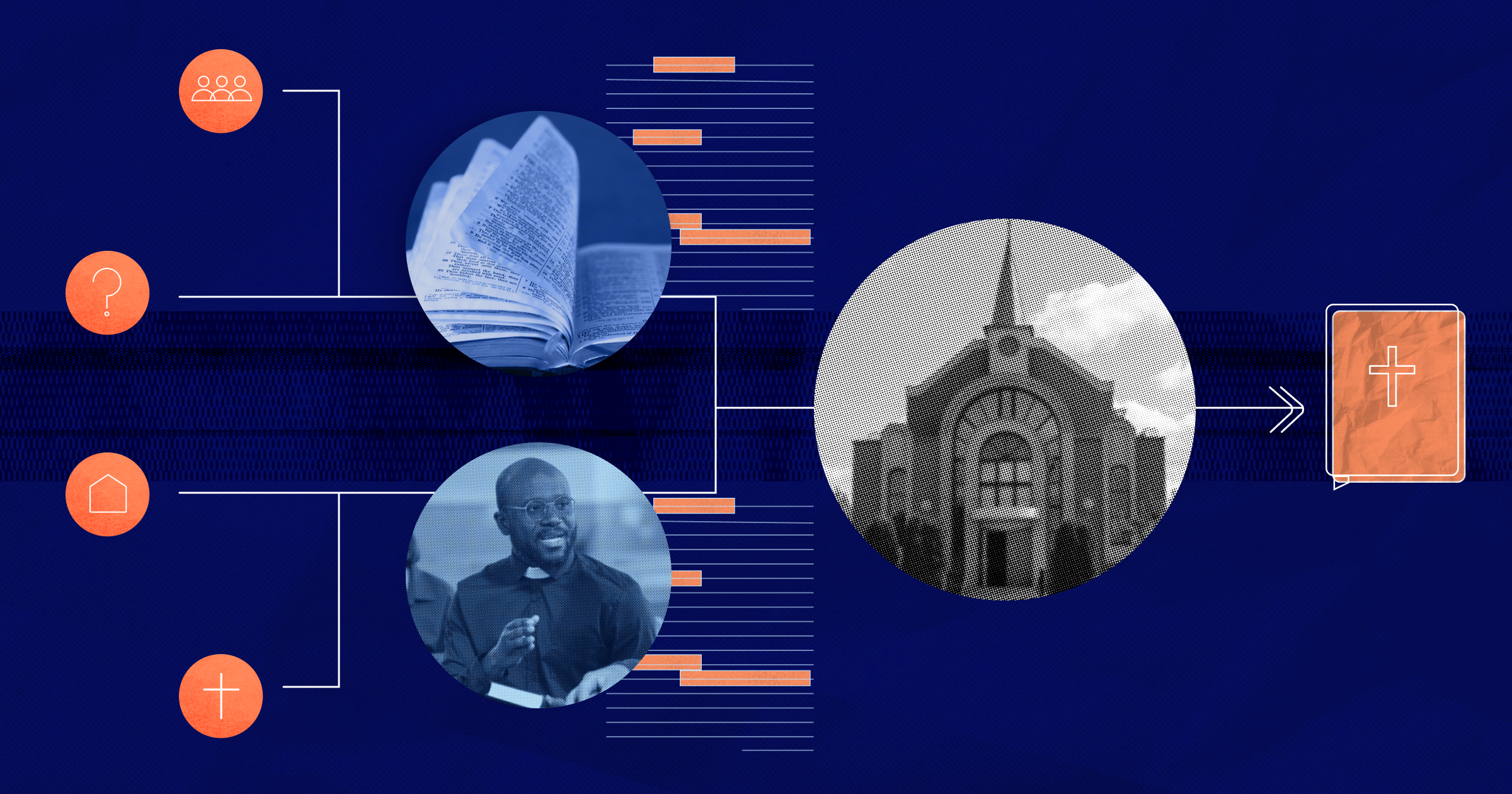
What is the Protestant Reformation, and why does it matter? Joel Beeke joins Kirk E. Miller to talk about the Reformation: Who were the Protestants, and why did they seek to reform the church? Kirk and Beeke explore the reason for the Reformation and unpack its core tenets like sola fide and sola scriptura. Tune in as they consider how these foundational beliefs reshaped the church and the life of everyday believers, and discover why the Reformation is not just a historical event but a vital part of evangelical Christian heritage.
Follow the show on YouTube, Spotify, Apple Podcasts, and more.
Table of contents
Start a 30-day free trial of Logos
Episode guest: Joel Beeke
Dr. Joel R. Beeke (PhD, Westminster Seminary) is chancellor and professor of homiletics and systematic and practical theology at Puritan Reformed Theological Seminary, a pastor of the Heritage Reformed Congregation in Grand Rapids, MI, editor of Puritan Reformed Journal and Banner of Sovereign Grace Truth, board chairman of Reformation Heritage Books, and a frequent speaker at Reformed conferences around the world. He has authored, co-authored, and edited 250 books, and has contributed thousands of articles to Reformed books, journals, periodicals, and encyclopedias.
Episode synopsis
What is the Protestant Reformation?
Joel Beeke traces the beginning of the Reformation to October 31, 1517, when Martin Luther posted his 95 Theses to the church doors in Wittenberg, Germany. Luther objected to corruption and abuses (most notably indulgences). Luther would come to insist that sinners are saved by Christ alone through faith alone, not by accumulating merit or purchasing remissions. These doctrines eventually spread across Europe.
What led to different branches of the Reformation?
Initially, this Lutheran form of the Reformation was synonymous with Protestantism. As the Reformation spread, however, Ulrich Zwingli’s and eventually John Calvin’s branch of the Reformation crystallized into a distinct Reformed stream.
When it came to worship, for instance, Luther sought to retain elements not forbidden by Scripture (i.e., the normative principle). If prudent and not prohibited, the church could use it. Calvin and the Reform stream of the Reformation, applied the Reformation more thoroughly to the church’s corporate worship, only allowing what Scripture positively prescribes for worship (i.e., regulative principle). These differences, along with disputes like Christ’s presence in the Lord’s Supper (Luther vs. Zwingli), contributed to lasting divergence between the Lutheran and Reformed wings of the Reformation.
A third, more radical branch, the Anabaptists (not to be confused with the later Baptists) emerged as well.
Later on, the Puritans (late 16th–17th centuries) labored to rekindle and apply the zeal of the Reformation comprehensively—marriage, work, parenting, piety—stressing “experiential religion” and practical holiness.
Why “Protestant”? Why “Reformation,” and not “Restoration”?
The label “Protestant” refers to the Reformer’s protest of Rome’s doctrinal errors (e.g., transubstantiation, indulgences) and moral abuses (e.g., clergy corruption). Beeke notes the term took hold in 1529 at the Diet of Speyer, where it was used to designate the movement.
“Reformation” highlights reforming the church according to Scripture, rather than inventing something novel or discarding the church’s historic faith. Luther initially hoped to reform the church from within. Yet when that intent was reject and blockaded (e.g., Luther was excommunicated), the Reformers were forced to continue their efforts beyond the Roman Catholic institution.
But, for example, Calvin, well-versed in the Church Fathers, emphasized that the Reformation aimed to recover and apply apostolic and ancient Christian teaching, restoring what had been abandoned.
What caused the Protestant Reformation?
Historians sometimes distinguish between what they call the formal and material causes of the Reformation:
- Material cause: How are we made right with God (justification), by faith alone or by faith and our merits? This was the presenting issue in the Protestant Reformation.
- Formal cause: Who gets to decide? Scripture or ecclesiastical pronouncements? This was the foundational disagreement at root in the Protestant Reformation.
Luther’s protest against indulgences and related penitential abuses centered on salvation and the sufficiency of Christ’s righteousness (the Reformation’s material cause).
The Roman Church posited itself as the authoritative interpreter of Scripture and decider on doctrine. In contrast, Reformers answered with came to be called sola scriptura: Scripture alone is the final authority for all matters of faith and practice (the Reformation’s formal cause).
What was at stake in the Protestant Reformation?
Beeke succinctly contrasts the Reformation’s position with Rome through what later become known as its five solas:
- Sola scriptura (“by Scripture alone”): Scripture, as God’s Word, inherently possess superlative authority, making it alone the supreme authority for faith and practice.
- Sola gratia (“by grace alone”): This Scripture teaches that we are saved by grace alone, not grace plus our merit.
- Sola fide (“by faith alone”): This grace is received by faith alone, not faith plus our works.
- Solus christus (“Christ alone”): This faith unto salvation is to be place in Christ alone, not Christ plus any other mediator or mechanism.
- Soli deo gloria (“Glory to God alone”): This salvation directs all the glory to God alone, not to us or the church.
Both Rome and the Reformers agreed on things like the necessity of grace and the authority of Scripture. Where they differed was in how Rome added to these (e.g., faith and works; Scripture and papal authority).
How did the Reformation transform the ordinary Christian’s life?
As Scripture came to be recognized as the final authority, this produced truly profound ripple affects within the church and throughout society:
- The people are given access to the Bible through the translation and teaching of Scripture.
- Preaching is now in the vernacular (the people’s own language), rich, and understandable.
- Assurance of salvation grows as believers rest on the gospel’s promises.
- Direct access to God through Christ replaces superstitious reliance on religious acts or auxiliary mediators.
- Worship simplifies around the Word, the gospel, congregational singing, and the Bible’s two—and only two—sacraments.
- Family discipleship flourishes. The family is regarded as “a little church,” encouraging family worship.
- Vocation is dignified. Every lawful calling is a sacred service to God, and the priesthood was not so “sacred” as to shun marriage.
In short, the Reformation moved faith from a mediated, institutionalized system toward an experiential, Word-saturated, Christ-centered one.
Why should we care about the Protestant Reformation? Does it still matter today?
Beeke shares ten reasons the Reformation (and with it, Reformed theology) remains important today. A reformational legacy is characterized by the following traits:
- God-centered focus: Reformed theology celebrates God’s glory as the center of everything and orders doctrine and life toward his praise.
- Anchored in Scripture: It employs reason, but submits to the Bible as the supreme standard. Scripture provides a moral and theological compass or “fence.” We honor God by staying within it.
- Whole-Bible application: With careful exegesis and use of the analogy of Scripture, Reformed theology integrates the whole of Scripture into a coherent, faithful synthesis (systematic theology).
- Historical and confessional fidelity: It stands in continuity with the ancient church and articulates its convictions in confessions and catechisms, always placed under Scripture and reformable by it.
- True catholicity: Not Roman Catholicism, but the orthodox consensus reflected in the Apostles’ Creed and early councils. Instead of being a new movement, it revives the old and expands upon it.
- Exalts Christ as the only mediator: Solus christus safeguards the gospel from adding mediators. Christ is our ever-living intercessor, and we must not add others beyond what God’s finished Word provides.
- A comprehensive worldview: Reformed faith touches on every sphere of life (work, marriage, family, piety, sanctification, ethics, philosophy, politics, education), not merely “five points” or five solas.
- Experiential, practical godliness: Truth must be experienced (e.g., trusting Christ’s intercession) and practiced (e.g., serving the poor, honoring one’s spouse, raising children in the Lord, working with integrity).
- Evangelism and mission: Reformed theology ought to motivate evangelism and missions.
- Faithful preaching: Reformed theology fuels faithful preaching that aims at glorifying God and enjoying him forever.
Joel Beeke’s recommend resources for further study
- Essentials of Reformed Systematic Theology by Joel Beeke and Paul Smalley
- European Reformations by Euan Cameron
Reformed Systematic Theology (4 vols.)
Save $30.97 (13%)
Price: $199.99
-->Regular price: $199.99
A Puritan Theology: Doctrine for Life
Save $15.01 (25%)
Price: $44.99
-->Regular price: $44.99
Additional works by Joel Beeke
Reformation Heritage KJV Study Bible (Notes only)
Save $2.01 (6%)
Price: $27.99
-->Regular price: $27.99
Reformed Preaching: Proclaiming God’s Word from the Heart of the Preacher to the Heart of His People
Price: $23.99
-->Regular price: $23.99
Living for God’s Glory: An Introduction to Calvinism
Save $5.60 (40%)
Price: $8.39
-->Regular price: $13.99
The Soul of Life: The Piety of John Calvin
Save $2.01 (20%)
Price: $7.99
-->Regular price: $7.99
365 Days with Calvin
Save $11.00 (61%)
Price: $6.99
-->Regular price: $17.99
Puritan Reformed Theology: Historical, Experiential, and Practical Studies for the Whole of Life
Save $9.01 (20%)
Price: $35.99
-->Regular price: $35.99
Meet the Puritans: With a Guide to Modern Reprints
Save $6.01 (17%)
Price: $28.99
-->Regular price: $28.99
Taking Hold of God: Reformed and Puritan Perspectives on Prayer
Save $2.01 (12%)
Price: $13.99
-->Regular price: $13.99
Related articles
- What Is the Protestant Reformation? Everything You Need to Know
- What Is a Protestant? Its History, Beliefs & Lasting Impact
- 5 Reformation Doctrines That Still Transform the Church
- If the Reformers Believed in Sola Scriptura, Why Quote the Church Fathers?
- What Is Reformed Theology? Its Roots, Core Beliefs & Key Leaders

 1 month ago
65
1 month ago
65








 English (US) ·
English (US) ·